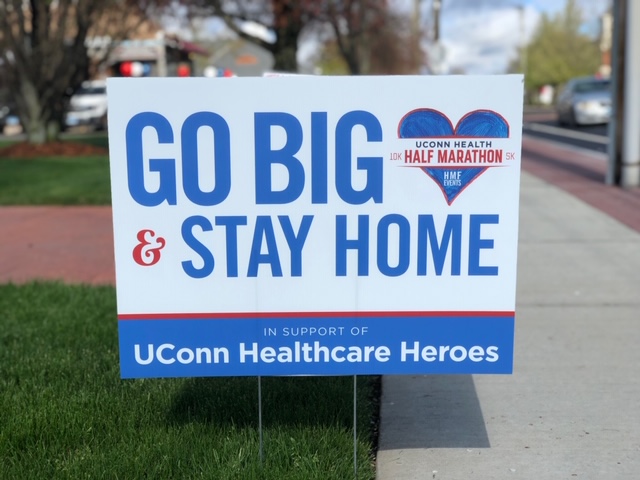While we can’t run or walk together this year due to the COVID-19 pandemic, the tradition of the UConn Health Half Marathon, 10k and 5k, will carry on virtually, along with the race’s Ironhorse Challenges (taking on all three race distances).
Register to run or walk the 13.1 miles, 10k, or 5k anywhere and anytime, while making sure to maintain social distance, during the weekend of June 4-7. Then be sure to share your finish time through your online account by 11:59 p.m. on Sunday, June 7.
At this unprecedented time, the Hartford Marathon Foundation is urging runners to keep training toward their goals. Your UConn Health Half Marathon results will still be part of the CT Triple challenge if you plan to progress from a 10k to half marathon to the annual Eversource Hartford Marathon held each October.
This year’s virtual participation will support the dedication and efforts of UConn Health’s heroes of doctors, nurses, and staff caring for COVID-19 patients on the frontlines at UConn John Dempsey Hospital. A portion of each registration will be donated to the UConn Health COVID-19 Rapid Response Fund.
Each race finisher will receive a downloadable race bib, finisher certificate, virtual race bag of discounts and deals, free music playlists and other training support resources. Also, post-event a race tech shirt and commemorative medal will be mailed to each participant.
Want to give more to charity? Participants may opt out of receiving swag to double their donation to the UConn Health COVID-19 Rapid Response Fund. Just select the “Donate my Swag” option during registration.
Don’t forget to remember to follow social distancing recommendations and all public safety directives – and post your photos on social media with #UConnHealthHalf and #UConnHealthHeroes.
If you’re running a half marathon or shorter races, always keep in mind these top 10 running safety tips from UConn Health’s Orthopedics & Sports Medicine experts:
- Make sure you train to run the race (and know your boundaries). When prepping for race day, a good general rule is to add no more than a 10 percent increase per week to your running mileage. Acute sports injuries can occur by doing too much, too soon. Be honest about the extent of your capabilities. Especially as you get older, your body may not be prepared to take on a race without pre-conditioning and slowly building up to a new level.
- Stay hydrated. Drinking enough water daily is critical, especially as your body temperature climbs during your exercise training sessions and of course the big race. It is recommended to drink 10-18 oz. of water one-two hours prior to exercise. Limit coffee and other caffeinated drinks, which dehydrate the body.
- Warm up and cool down. Perform about 15-20 minutes of simple warm-up exercise, like jogging, walking, or stretching, before and after training sessions and the big race. And don’t forget to drink water.
- Fuel your body.In addition to lots of water, you should be maintaining a healthy daily diet low in fat and rich in color fruits and vegetables. A few days before race day you should be consuming more carbohydrates like pasta, not fats, to fuel your performance in the upcoming race. And a few hours before the race make sure to eat a carb-based breakfast.
- Listen to your body aches. Appropriate early diagnosis of sports injuries is important. If you injure yourself or a notice change in your body’s function without a specific injury, and symptoms linger after two weeks of icing and over-the-counter anti-inflammatories, seek expert sports medicine care. If left untreated, symptoms, pain, and the injury itself could worsen. Also, during the race classic leg cramps are common especially if you are dehydrated. If a cramp strikes, stop and gently stretch and massage the cramped muscle. Sharp, sudden, extreme pain that does not feel like a typical cramp signals you to stop and signal for assistance from the course volunteers.
- Monitor your heart rate. Wearing a fitness tracking device to safely monitor your heart rate as you train and during the race is a good idea. At rest, a normal heart rate is 60-100 beats per minute. With maximal exertion, a peak heart rate is 220 minus your age and during exercise, a safe heart rate ranges from 60-80 percent of your maximum heart rate. Some advanced athletes may have a lower heart rate at rest or exertion. To manually check your heart rate place both your index and third finger on your side of your neck to locate your pulse. Then count the number of beats you feel in 15 seconds and multiply by 4.
- Recognize signs of heart attack. If you experience unusual shortness of breath, chest pain or pressure, arm or shoulder pain, or become lightheaded stop your physical activity immediately and seek medical attention by calling 9-1-1 or flagging a race volunteer.
- Test your gear. Make sure you thoroughly test your light-weight running shoes and also socks to ensure they will be able to help carry you the length of the race and across the finish line (minus the blisters and sore feet). Also, wear breathable, comfortable clothing that won’t irritate your skin during the long race. On a potentially warm race day dressing in layers that you can discard during the race can keep your body warm at the starting line but cool during the race.
- Get enough sleep. While you may be tempted to burn the candle at both ends to get in enough training exercise, it’s important to aim for 7-8 hours of sleep a night to allow your body to recover especially before race day.
- A few days or a week before the race it is recommended to rest your body in preparation with no or limited exercise.
To register for the UConn Health Half Marathon, 10k, or 5k, which UConn Health is the proud sponsor, visit: here.



